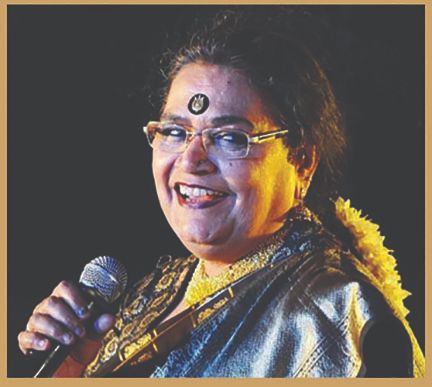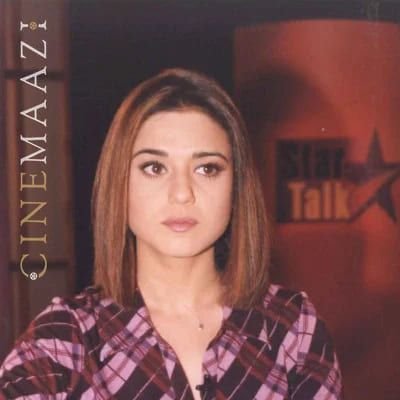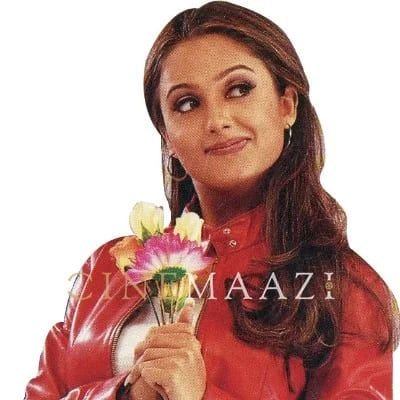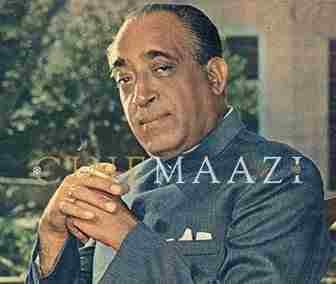Usha Uthup

Subscribe to read full article
This section is for paid subscribers only. Our subscription is only $37/- for one full year.
You get unlimited access to all paid section and features on the website with this subscription.
Not ready for a full subscription?
You can access this article for $2 , and have it saved to your account for one year.
- Real Name: Usha Vaidyanath Someshwar Sami
- Born: 7 November, 1947 (Bombay, India)
- Primary Cinema: Hindi
- Parents: Vaidyanath Someshwar Sami
- Spouse: Ramu Iyer (deceased), Jani Chacko Uthup
- Children: Anjali, Sunny
Instantly identified by her trademark Kanjeevaram silk sari, fresh flowers in her hair, large bindi, beaming smile, and throaty vocals, Usha Uthup is a well-recognised playback singer and vocal performer. Known for her popular film songs such as One two cha cha cha (Shalimar, 1978), Rambha ho ho ho (Armaan, 1981), Doston se pyaar kiya (Shaan, 1980), and Darling (7 Khoon Maaf, 2011), the vibrant, husky-toned Usha Uthup is also a well-known singer of Indi pop and jazz since the 1960s. Winner of the Filmfare Best Female Playback Singer for Darling recorded with Rekha Bhardwaj, she has also appeared onscreen in a cameo in Bombay To Goa (1972), the Malayalam film Pothan Vava (2006), Bow Barracks Forever (2004) directed by Anjun Dutt, and Vishal Bhardwaj’s 7 Khoon Maaf. Singing and performing in more than 16 lndian languages, to enthusiastic participation from audiences, her music has not been restricted by linguistic or geographical boundaries. Among the honours she has been presented are the Padma Shri Award in the year 2011, Rajiv Gandhi Purashkar for national integration for quality music, Mahila Shiromoni Purashkar for international peace, and Channel [V] award for outstanding achievement.
Born Usha Vaidyanath Someshwar Sami on 7 November, 1947 in Bombay, she hailed from a traditional middle class South lndian family. Her father was a policeman, who rose to become Deputy Commissioner of Police, Bombay, while her mother was a simple, yet well read, intelligent housewife. Usha’s elder sisters, lndira and Uma, comprised the famous singing Sami sisters. Though not formally trained in music, Usha grew up in a musically-imbued family, which listened to varied forms of music from classical to Hindustani and Carnatic including Kishori Amonkar and Bade Ghulam Ali Khan. On the advice of her neighbour Jamila, daughter of the then Deputy Commissioner of Police S M A Pathan, she learnt Hindi and took up Indian classical music. This would add an interesting dimension to Usha’s brand of pop music in the 1970s.
Usha first sang in public when she was just 9, via an opportunity by popular radio announcer Ameen Sayani. She had been introduced to Sayani by her sisters, who had already been exploring a career in music. Thus did she get the chance to sing the number Mockingbird hill on Radio Ceylon’s Ovaltine Music Hour. It was the first of several appearances over her teenage years. Her music career started in Chennai in 1969, singing in a small nightclub called Nine Gems. It was located in the basement of the Safire theatre complex on Mount Road. Her performance was well-received and her gig was extended. She also began singing in Calcutta’s popular nightclubs such as Trincas, as well as Bombay’s erstwhile Talk of the Town. It was while she was performing at the Oberoi in Delhi, that she was spotted by Dev Anand; the Navketan film crew was in the capital at the time. She was offered the chance to sing playback in films, and went on to start her film career with Ivory-Merchant’s Bombay Talkie (1970). She sang an English number in the film composed by Shankar-Jaikishan, called Hari om tat sat. It was followed by the Dev Anand directorial Hare Rama Hare Krishna (1971). She was originally supposed to sing the iconic Dum maro dum along with Asha Bhosle for the film, but ended up singing an English verse.
She went on to sing several songs in the 1970s and 1980s mainly for music directors R D Burman and Bappi Lahiri. Among the films she rendered playback for are Roop Tera Mastana (1972), Siva Thaandavam (1977), Shalimar (1978), Hum Paanch (1980), Shaan (1980), Disco Dancer (1982), Bhavani Junction (1985), Locket (1986), Naaka Bandi (1990), Ram Shastra (1995), Daud: Fun On The Run (1997), Godmother (1999), Jajantaram Mamantaram (2003), Hattrick (2007), Don 2 (2011), Kahaani (2012), Revolver Rani (2014), Rock On 2 (2016), Cabaret (2019), and Sab Kushal Mangal (2020). She also reprised R D Burman hit songs such as Mehbooba mehbooba, increasing their popularity.
Uthup has had enormous success in the realm of non-film music. In 1968, she recorded covers of two pop songs in English, Jambalaya and The Kingston Trio's Greenback dollar, on an EP, Love Story, as well as Scotch and soda, another Kingston Trio song, which sold very well. Spending time in London during this early period, she often visited Vernon Corea's BBC office at the Langham in London. She was interviewed on London Sounds Eastern on BBC Radio London. Visiting Nairobi as part of an Indian festival, she became so popular that she was invited to stay on. Her nationalistic songs rendered in Swahili made her very popular; she was even made an Honorary Citizen of Kenya by the then President Jomo Kenyatta. Her song Malaika rendered with original singer Fadhili Williams became very popular. She also produced a record Live in Nairobi with a local band Fellini Five.
Popular for her vibrant and lively stage presence, she has performed all over the world. Uthup has rendered songs in English, Hindi, Gujarati, Marathi, Punjabi, Konkani, Malayalam, Bengali, Telugu, Kannada, Tamil, Bhojpuri, Rajasthani, Dogri, Khasi, Assamese, Oriya, Sindhi or Spanish, French, German, ltalian, Zulu, Swahili, Sinhala, Russian, and Ukrainian. She sang the song Aage badho for women’s empowerment in 15 languages, for the Government of India, and also composed and recorded a song called The Peace Prayer based on a poem by President APJ Abdul Kalam. She also sang for Karadi Rhymes, a two-volume collection of children’s rhymes which reflect the Indian ethos.
At the behest of then PM Rajiv Gandhi, she pioneered the path-breaking show on Doordarshan, Pop Time. She has also featured as judge on TV in the singing reality show Bharat Ki Shaan: Singing Star – Seasons 2 and 3, as well as the chief guest for a Marathi singing reality show. Usha Uthup has also sung for many charitable causes such as the Red Cross, Spastics Society of India, Mother Teresa related charities, cancer institutes, schools for the blind, old aged homes, government charity drives and various drought and flood relief funds. Honoured with the coveted Padma Shri Award in the year 2011, Usha Uthup believes music to be not just her lifestyle but an instrument of love, which she continues to use to spread a message of love and unity, peace and harmony, tolerance, integrity, and happiness.







.jpg)



